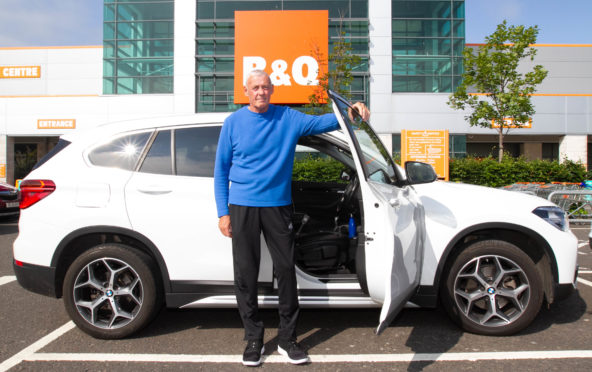
David Eaglesham insists he is happy to go to court over a parking ticket that shot from £60 to £160 and that he feels was issued unfairly.
The retired procurement manager was recently out of hospital after his third hip replacement when his wife drove him to Hermiston Gait Retail Park in Edinburgh last December.
“Although I couldn’t walk without crutches, I hadn’t yet qualified for a Blue Badge parking pass,” said David, who at the time was unable to drive as a result of the operation.
The car park was quiet and, as there was no drop-off zone outside B&Q, his wife used a disabled bay near the entrance after an employee said it would be OK.
However, when the couple returned to the car they found a parking ticket from UKPC for £60 attached to the windscreen.
“We were in B&Q for only 10 minutes and the ticket was issued just three minutes after we had parked,” said David, 64, from Edinburgh.
“My wife spoke to the attendant but he was adamant he wouldn’t reverse his decision and we had to write to head office. He didn’t want to apply any common sense to the situation.”
David said he wrote to UKPC on nine occasions asking for the ticket to be waived but had no joy.
He even included letters from his doctors confirming his medical condition but then a debt collection company became involved and the amount rose to £160.
David wrote to Raw Deal but UKPC declined to cancel the ticket. Instead, David received a letter asking who was driving the car at the time, and another demand for £160. “Our final decision has been made,” the company told Raw Deal.
Parking operators in England and Wales are allowed to hold the vehicle’s owner liable for unpaid charges if they don’t know who the driver was and the owner refuses, or is unable, to name the driver.
However, in Scotland only the driver is liable for the ticket, not the keeper.
According to motorist rights organisations, a private parking company may write to the keeper requesting the name of the driver and/or payment. But the keeper is under no obligation to provide the name of the driver, nor pay the charge.
“I am the owner of the car but I wasn’t driving it and therefore I feel UKPC has no legal standing to issue me a ticket,” said David. “I accept the parking space was for Blue Badge holders but, given my circumstances, surely some common sense can be applied?
“I am quite prepared to go to court over this, if need be.”
So what are your rights, should you find yourself in the same situation as David?
Parking tickets doled out by private companies are different from Penalty Charge Notices which are issued by council traffic wardens and the police. These are regulated fines, backed by legislation.
According to legal experts, private parking tickets in Scotland are based on the law of contract.
Once a motorist drives into a space in a private car park, then sees a sign stating the length of stay and details of fines, he or she is entering a contract.
In Scotland, a contract does not need to be in writing.
The contract is between the landowner and the driver – not the owner or registered keeper.
If a car-park landowner (or parking company acting on their behalf) was to successfully sue the driver in court, they would have to prove on the balance of probabilities that the person they were suing was indeed the driver of the car.
If it was proved a driver breached the contract, they would be liable to pay damages.

Enjoy the convenience of having The Sunday Post delivered as a digital ePaper straight to your smartphone, tablet or computer.
Subscribe for only £5.49 a month and enjoy all the benefits of the printed paper as a digital replica.
Subscribe